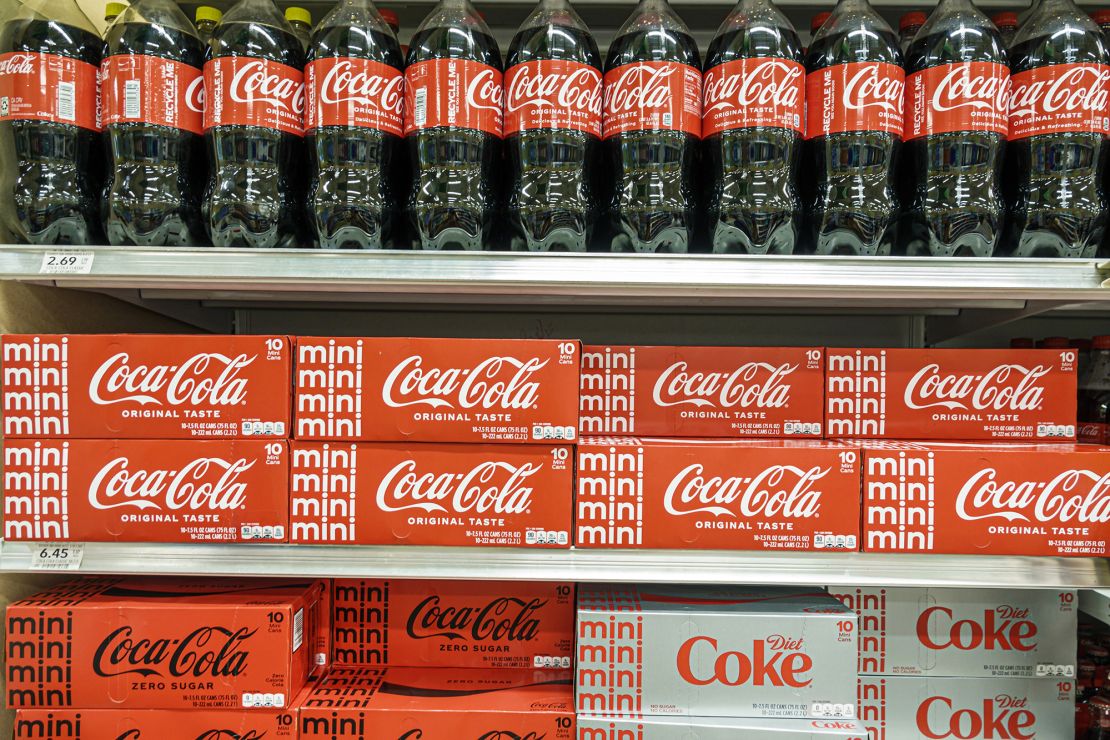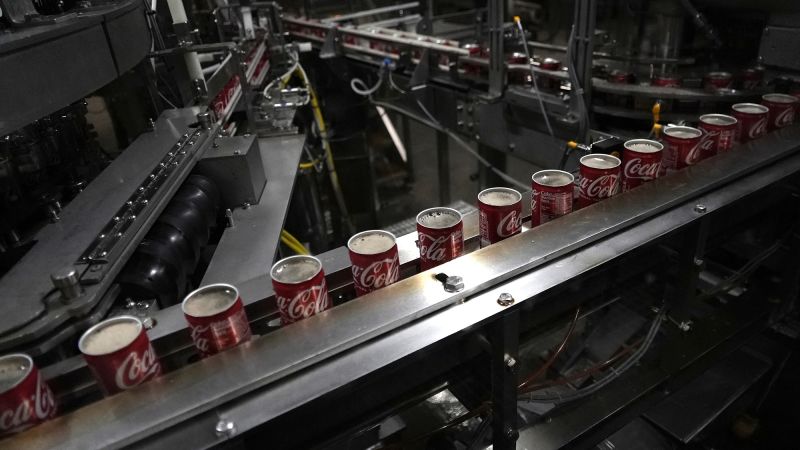CNN
—
American consumers don’t need to fret about President Donald Trump’s tariffs on aluminum raising the price of their can of soda.
Two weeks ago, Trump announced a 25% tariff on all steel and aluminum imports into the United States that would go into effect March 12, worrying some soda drinkers that another staple will take more out of their wallet.
But shortly after the executive order, beverage companies began assessing what the tariffs could mean for their industry — and the results weren’t too concerning.
Coca-Cola CEO James Quincey suggested the company could move away from using aluminum and increase production of other packaging materials to ensure affordability and meet consumer demand.
“If aluminum cans become more expensive, we can put more emphasis on (plastic) bottles,” Quincey said in the company’s fourth-quarter earnings call on February 11.
The tariffs will likely have almost no impact on consumer prices, according to Adam S. Hersh, a senior economist at the Economic Policy Institute.
“Corporations have more than sufficient profit margins to absorb small price increases to a small input to production,” he said.
In 2023, data showed the Coca-Cola Company packaged almost 50% of its drinks in plastic bottles, 25% in aluminum cans, and the remaining 25% in glass bottles and other packaging. Data from Keurig DrPepper showed they packaged 27% of their drinks in plastic bottles, 13% in aluminum cans and 8% in glass.
Quincey also made clear that while tariffs on aluminum will likely result in an extra cost, they are unlikely to have a significant impact on beverage corporations the size of Coca-Cola.
“I think we’re in danger of exaggerating the impact of the 25% increase in the aluminum price relative to the total system. It’s not insignificant, but it’s not going to radically change a multibillion-dollar US business,” he said.
“It’s a cost. It will have to be managed. It would be better not to have it relative to the business, but we are going to manage our way through.”
A can costs a little bit less than 4 cents to produce, according to Hersh. “If we put a 25% tariff on that, it would raise the cost of the can to 5 cents,” he said, adding that it would increase the production cost of a six-pack by 6 cents.
Investors largely agree aluminum tariffs won’t result in significant cost hikes as share prices of beverage corporations have been relatively stable since they were announced, according to Hersh.
Most beverage corporations outsource packaging to bottlers, and it is the bottlers who purchase raw aluminum and ultimately decide on pricing and strategy, says Filippo Falorni, a beverage analyst at Citi.
Coca-Cola sells its concentrate to bottlers, who mix it with water and package it on production lines that are interchangeable.
“It’s quite easy to change production lines from cans to bottles,” Falorni said.

Increasing the use of plastic packaging instead of aluminum is primarily a cost-mitigation strategy, given the ease of switching production lines — and not necessarily because of prohibitively high aluminum prices, he said.
But switching to other kinds of packaging might be more complicated for smaller beverage companies and ones that package in-house, as CNN previously reported.
Moving away from aluminum cans can be “a colossal decision,” and it “normally takes a period of years to make a transition like that successfully,” said William Pietersen, a professor at Columbia Business School and former CEO of Lever Foods, Seagram USA and Tropicana.
Since Trump announced the new tariffs, aluminum prices have climbed over 4%, which Hersh called “relatively stable.”
The Coalition of American Metal Manufacturers and Users (CAMMU) said 25% tariffs on steel and aluminum could directly harm domestic manufacturers.
“Re-imposing 25 percent tariffs on steel and aluminum imports from our allies and without a workable exclusion process puts U.S. manufacturers directly in harm’s way,” according to a statement from CAMMU.
“Foreign customers are shifting their supply chains away from U.S. producers. Once removed, especially for smaller, family-owned businesses, it is difficult to regain that lost business,” the statement reads.
In 2024, the United States imported about 47% of the aluminum consumed domestically, according to the US Geological Survey.
But when combining the tariffs from Trump’s first term, the price of aluminum traded on the market and the domestic production of aluminum have seen a real impact in recent years, Falorni said.
Within the beverage industry, companies adapt to price hikes in different ways.
Companies like Coca-Cola, with only 25% of their revenue coming from the United States, can offset rising costs by leveraging earnings from other markets.
This flexibility makes the company less vulnerable to aluminum tariffs than companies like Keurig Dr Pepper, which relies heavily on the US market and is more exposed to domestic price fluctuations, Falorni said.
While about a quarter of Coca-Cola products come in aluminum cans, consumers are also accustomed to plastic and glass bottles.
Energy drinks like Monster and seltzers like White-Claw are predominantly sold in cans, with few viable alternatives. For these brands, shifting to other materials could hurt demand, leaving them with little choice but to pass higher costs on to consumers, according to Falorni.
While switching to plastic and glass packaging would have a minor financial impact on soft-drink companies like Coca-Cola, it could be “devastating” for the environment, according to Judith Enck, the president of Beyond Plastics and a former regional administrator at the Environmental Protection Agency.
“Any significant shift toward more plastic bottles is a huge environmental problem,” Enck told CNN.
Refillable glass containers are the most sustainable packaging option for beverage companies, followed by aluminum cans (because they can be easily recycled) and then single-use glass bottles. Plastic is one of the least sustainable, as about 16,000 chemicals are used to produce plastics, according to Enck.
Coca-Cola bottles are the world’s No. 1 source of plastic pollution. In December, the company announced a drastic reduction of its packaging sustainability goals.
Beverage corporations likely won’t feel much blowback from the Trump administration should they choose less sustainable packaging.
“The Trump administration is sending a very clear message that they do not prioritize environmental protection,” Enck said.
“I don’t think big companies feel any pressure to change.”
CNN’s Jordan Valinsky and Alicia Wallace contributed to this report.

